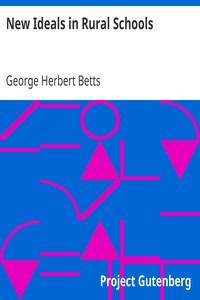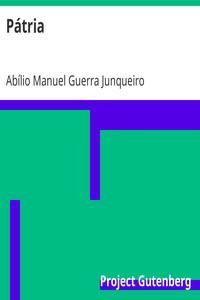|
|
Read this ebook for free! No credit card needed, absolutely nothing to pay.Words: 35921 in 12 pages
This is an ebook sharing website. You can read the uploaded ebooks for free here. No credit cards needed, nothing to pay. If you want to own a digital copy of the ebook, or want to read offline with your favorite ebook-reader, then you can choose to buy and download the ebook. EDITOR'S INTRODUCTION v PREFACE ix OUTLINE 121 EDITOR'S INTRODUCTION In presenting a second monograph on the rural school problem in this series we register our sense of the importance of rural education. Too long have the rural schools suffered from neglect. Both the local communities and the State have overlooked the needs of the rural school system. At the present hour there is an earnest awakening of interest in rural life and its institutions. Already there is a small but certain movement of people toward the country and the vocation of agriculture. A period of agricultural prosperity, the reaction of men and women against the artificialities of city life, the development of farming through the application of science, and numerous other factors have made country life more congenial and have focused attention upon its further needs. It is natural, therefore, that the rural school should receive an increased share of attention. It is not so clear, however, that rural patrons, school directors, and teachers have become fully aware of their duty in the matter of rural school improvement. To be sure much has been done by way of experiment in many rural communities; but it can scarcely be said that rural communities in general are thoroughly awake to the importance of their schools. The evidence to the contrary is cumulative. The first immediate need is to reawaken interest in the school as a center of rural life, and to suggest ways and means of transmuting this communal interest into effective institutional methods. To this end, Professor Betts has been asked to treat the rural school problem from a standpoint somewhat different from that assumed by Professor Cubberley; that is, from the point of view of the local community immediately related to, and concerned with, the rural school. In consequence his presentation emphasizes the things that ought to be done by the local authorities,--parent, trustee, and teacher. Its soundness may well be judged by the pertinent order of his discussion. Having stated his problem, he initiates his discussion by suggesting how the social relations of the school are to be reorganized; only later does he pass to the detail of curricula and teaching methods. It is a clear recognition of the fact that the community is the crucial factor in the making of a school. The State by sound fiscal and legislative policies may do much to make possible a better country school; but only the local authorities can realize it. The trained teacher with modern notions of efficiency may attempt to enlarge the curriculum and to employ newer methods of teaching, but his talents are useless if he is hampered by a conservative, unappreciative, and indifferent community. When the school becomes a social center of the community's interest and life, there will be no difficulty in achieving any policy which the State permits or which a skilled teacher urges. Scattered schools will be consolidated, and isolated ungraded schools will be improved. Given an interested community, the modern teacher can vitalize every feature of the school, changing the formal curriculum into an interesting and liberalizing interpretation of country life and the pedantic drills and tasks of instruction into a skillful ministry to real and abiding human wants. PREFACE No rural population has yet been able permanently to maintain itself against the lure of the town or the city. Each civilization at one stage of its development comprises a large proportion of rural people. But the urban movement soon begins, and continues until all are living in villages, towns, and cities. Such has been the movement of population in all the older countries of high industrial development, as England, France, and Germany. A similar movement is at present going on rapidly in the United States. No great social movement ever comes by chance; it is always to be explained by deep-seated and adequate causes. The causes lying back of the rapid growth of our cities at the expense of our rural districts are very far from simple. They involve a great complex of social, educational, and economic forces. As the spirit of adventure and pioneering finds less to stimulate it, the gregarious impulse, the tendency to flock together for our work and our play, gains in ascendancy. Growing out of the greater intellectual opportunities and demands of modern times, the standard of education has greatly advanced. And under the incentive of present-day economic success and luxury, comfortable circumstances and a moderate competence no longer satisfy our people. Hence they turn to the city, looking to find there the coveted social, educational, or economic opportunities. It is doubtful, therefore, whether, even with improved conditions of country life, the urbanization of our rural people can be wholly checked. But it can be greatly retarded if the right agencies are set at work. The rural school should be made and can be made one of the most important of these agencies, although at the present time its influence is chiefly negative. With the hope of offering some help, however slight, in adjusting the rural school to its problem, this little volume is written by one who himself belongs to the rural community by birth and early education and occupation. NEW IDEALS IN RURAL SCHOOLS THE RURAL SCHOOL AND ITS PROBLEM The general problem of the rural school is the same as that of any other type of school--to render to the community the largest possible returns upon its investment in education with the least possible waste. Schools are great education factories set up at public expense. The raw material consists of the children of succeeding generations, helpless and inefficient because of ignorance and immaturity. The school is to turn out as its product men and women ready and able to take up their part in the great world of activities going on about them. It is in this way, in efficient education, that society gets its return for its investment in the schools. Free books android app tbrJar TBR JAR Read Free books online gutenberg More posts by @FreeBooks

: Among the Sioux: A Story of the Twin Cities and the Two Dakotas by Creswell R J Robert J - Dakota Indians Missions; Missionaries Great Plains Biography@FreeBooksTue 06 Jun, 2023
|
Terms of Use Stock Market News! © gutenberg.org.in2025 All Rights reserved.






